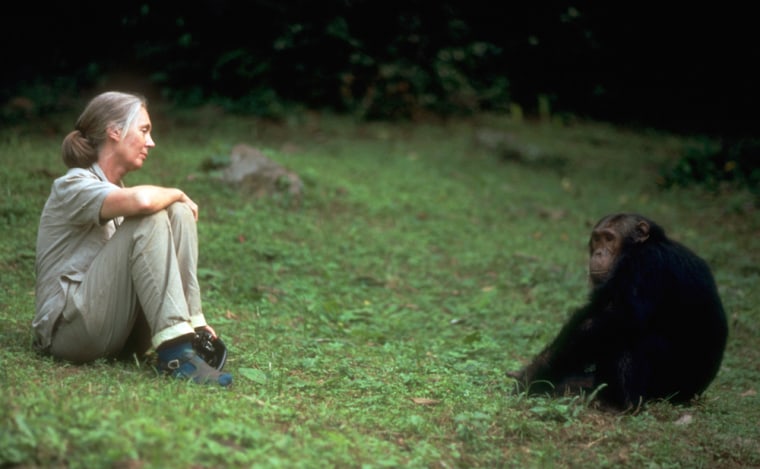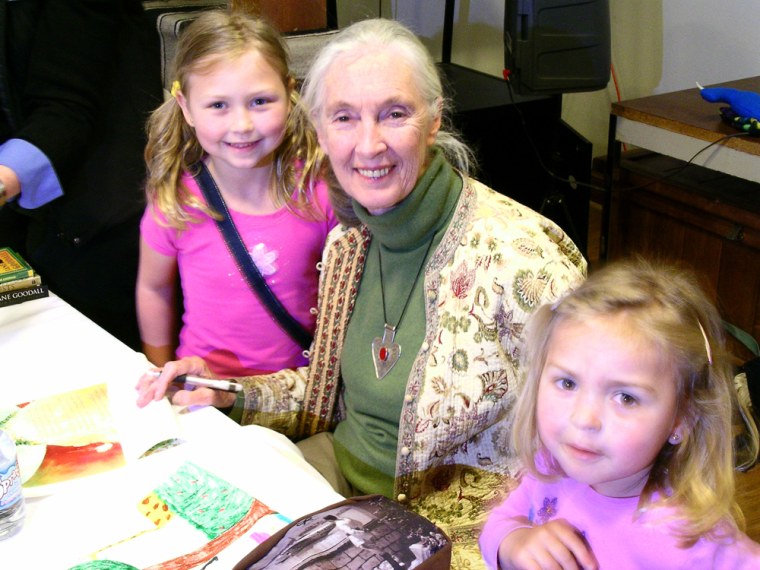Jane Goodall is world famous for her work with chimpanzees, but it’s her work with children that she shared with Americans this Earth Day.
During a blitz of media interviews and appearances before and on Earth Day last Saturday, Goodall drew attention to her Roots & Shoots program, which gets children to explore and protect their environments. Started in Tanzania in 1991 with 16 students, the program now has nearly 8,000 groups in 90 countries.
Goodall has also teamed up with Weekly Reader, a children’s magazine read in schools across the country, for an Earth Day contest and survey asking “How Green is Our Future?”
The focus on children carried over to a huge Earth Day event Saturday at the Franklin Park Zoo in Boston. Some 5,000 children and adults crammed into a tent to hear about Roots & Shoots as well as Goodall’s Earth Day message of peace, hope, and how each person can make a difference.
In an interview with MSNBC.com, Goodall explained why and how she’s turning her attention far from the shores of East Africa’s Lake Tanganyika, where she started her research on chimps in 1960.
Q: What was your focus on Earth Day 2006?
This year many of our Roots & Shoots groups focused projects on water issues around the world. Of concern were ground water levels, pollution, waste disposal, and access to clean water. Roots & Shoots just teamed up with Weekly Reader Research to complete an essay contest and poll of more than 20,000 young people to hear their concerns and attitudes about the natural world. This is a good example of how kids really care about the environment and a good way to give them a voice to express their thoughts and concerns. We almost had our new Roots & Shoots website, , ready for Earth Day. It’s going to be up in June. I’m very excited about it because among other features, it will give all our groups around the world a way to communicate with each other.

Q: Have your interests changed since you started your career? It seems they've certainly evolved beyond studying primates.
I could kill myself trying to save chimpanzees but what’s the point if we’re not educating the younger generation to be better stewards of the earth than we were. At the Jane Goodall Institute there is a big focus on working with youth.
And children are changing attitudes of their parents.
Q: Beyond getting children involved, how else do you hope to have a positive impact on environmental issues?
By writing books, lecturing and speaking to as many people as possible. Also through my films such as the ones I make with Discovery Communications’ Animal Planet, and through our websites. Of course the 8,000 Roots & Shoots groups worldwide and the work they do in their communities has a great positive impact.
Q: Do you feel you're making progress in the environmental work you do?
It's different for each country. In some great progress has been made. In others it’s slower, smaller steps. Time is running out, though. We need more people involved.
Q: Where would you rather spend your time: the field or the urban jungle?
The field, but being in the field doesn’t help save the natural world. One of the advantages of all the travel is the amazing people I meet. They help keep me inspired.
Q: What do you expect your priority for Earth Day 2007 will be?
This depends on the success of our programs going forward. It also depends on international politics to a certain extent. We might be responding to another crisis. Loss of biodiversity, global warming, preserving chimpanzees, and redoubling our efforts to get people to save water are all important. And with the help of Weekly Reader and others, we will continue to monitor attitudes and reach as many youth as possible.
